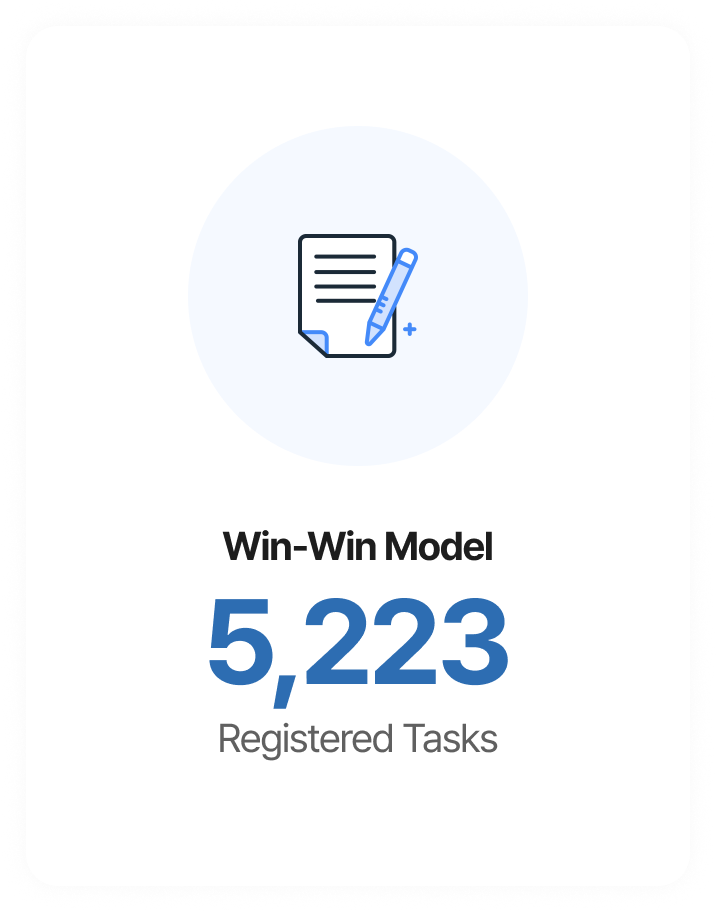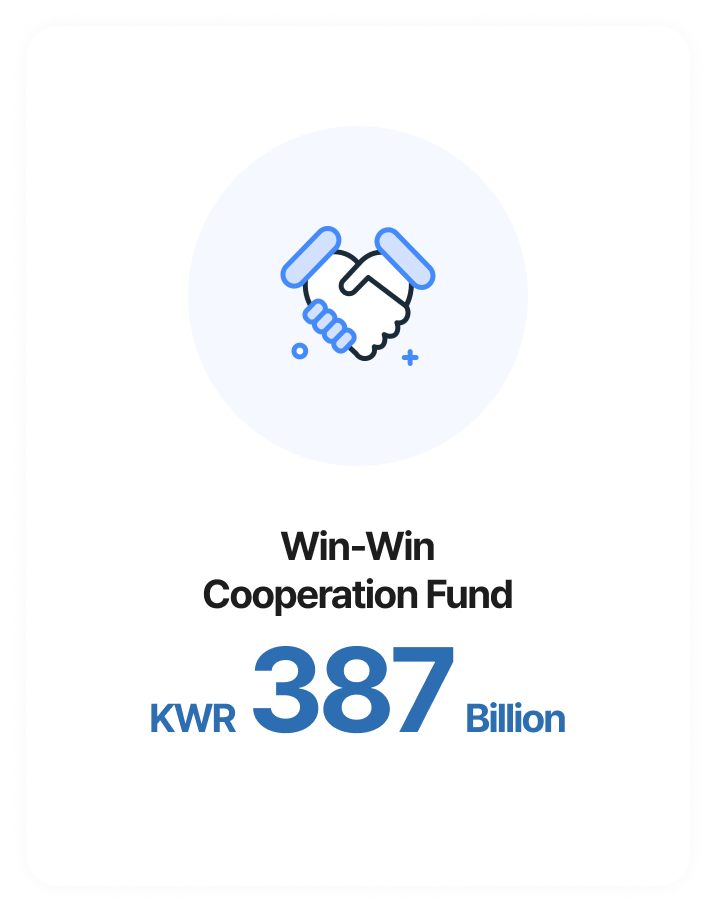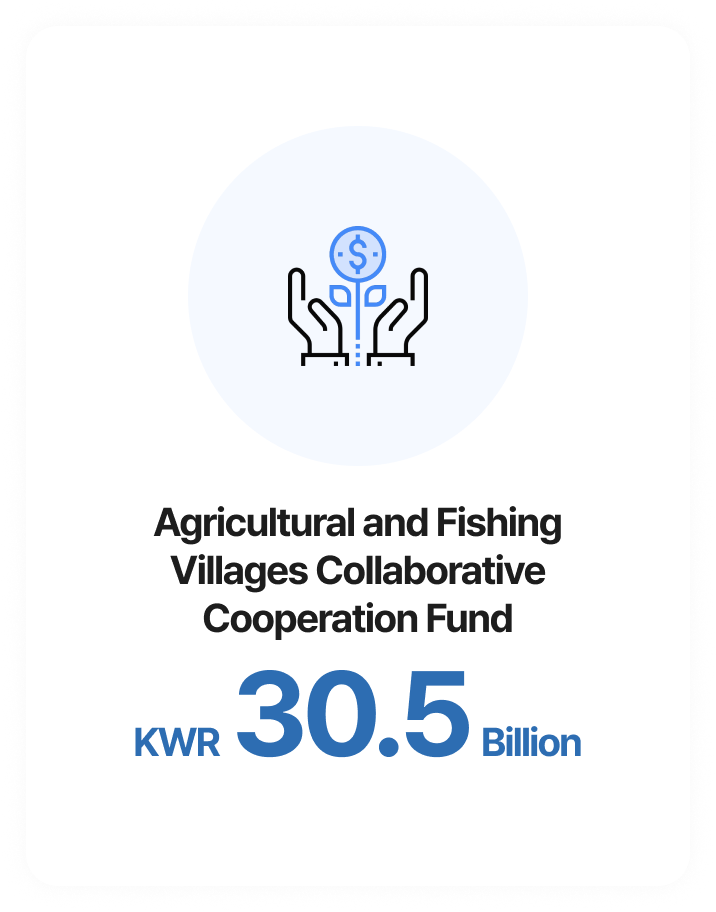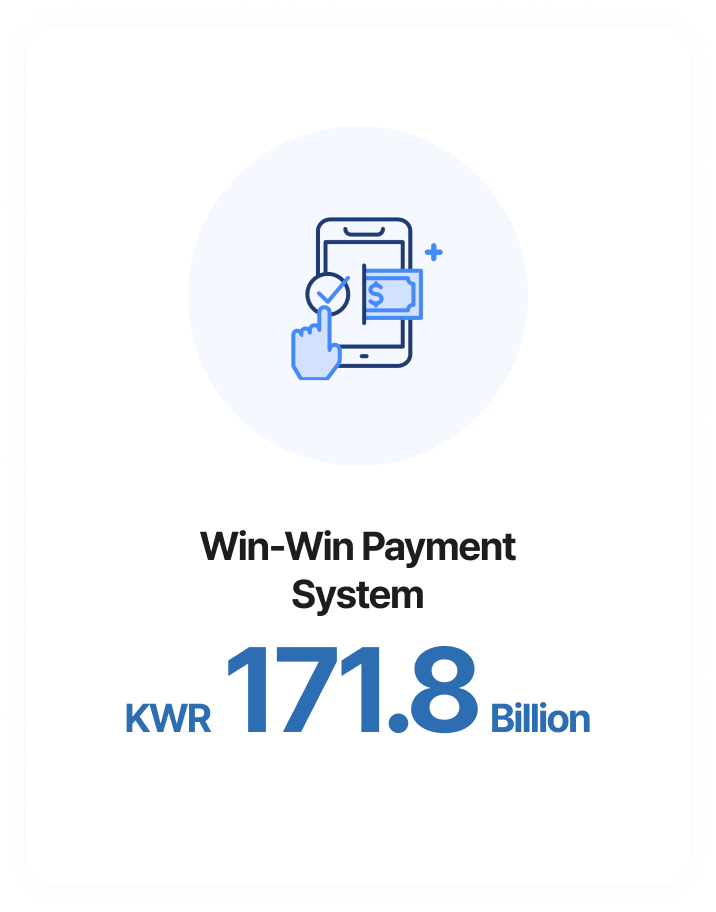Promoting Sustainable
Growth through
Cooperation between
Large Companies,
SMEs and Rural
Communities
WHO WE ARE
Our Purpose
Korea Foundation for Cooperation of Large & Small Business, Rural Affairs (KOFCA) promotes mutual cooperation between large companies and SMEs, enhancing the competitiveness of both sectors and alleviating polarization. Furthermore, by fostering mutual cooperation between companies and agricultural communities, it contributes to the sustainable growth of our society.
Korea Commission for Corporate Partnership (KCCP) aims to facilitate private sector agreements related to co-growth(win-win growth) between large companies and SMEs, as well as endeavoring to foster and spread a culture of co-growth(win-win growth).
What We Do

Assess and publish the win-win index and public institutions’ win-win growth evaluation
Reach an agreement on and publicly disclose suitable types of businesses for SMEs, and recommend types of businesses that support the livelihood of micro enterprises
Mediate win-win agreements between large companies and SMEs and operate the win-win council
Under the "Act on the Promotion of Mutually Beneficial Cooperation between Large Enterprises and Small and Medium Enterprises(Win-Win Cooperation Act)"
Manage and operate the fund for cooperation between large companies and SMEs(Win-Win Cooperation Fund) as well as the fund for cooperation with rural communities(Agricultural and Fishing Villages Collaborative Cooperation Fund)
Support the development and operation of cooperative programs between large companies and SMEs
Provide support for the protection of technology in SMEs and for the fairization of procurement and subcontracting transactions
Implement performance-sharing systems(Win-Win Model) and joint expansions of large companies and SMEs, etc.
Under the "Act on the Promotion of Mutually Beneficial Cooperation between Large Enterprises and Small and Medium Enterprises(Win-Win Cooperation Act)"Major Achievements
Our History
-
December, 2004
Established and launched the “Korea Foundation for Cooperation
of Large & Small Business” -
March, 2006
Enactment of the "Act on the Promotion of Mutually Beneficial Cooperation
between Large Enterprises and Small and Medium Enterprises(Win-Win
Cooperation Act)" -
December, 2010
Enactment of the "Act on the Promotion of Mutually Beneficial Cooperation
between Large Enterprises and Small and Medium Enterprises(Win-Win
Cooperation Act)" -
October, 2011
Adopted a Scheme on the "Businesses Suitable for SMEs"
-
December, 2014
Designated as an exclusive institution for protecting technologies of SMEs
-
April, 2015
Launched the “Win-Win Payment System”
-
January, 2017
Renamed as the “Korea Foundation for Cooperation of Large & Small
Business, Rural Affairs”
-
November, 2017
Legislation of the “Win-Win Cooperation Fund”
-
December, 2018
Adopted a Scheme on the "Businesses Suitable for Livelihood of Micro
Enterprises" -
2019~2020
Started to support small business owners by providing payment terminals
-
October, 2020
Designated as a support agency for development of markets
Under the "Act on Facilitation of Purchase of Small and Medium Enterprise-Manufactured
Products and Support for Development of Their Markets" -
March, 2023
Established the “Consignment and Commission Dispute Mediation Council”
-
July, 2023
Designated as a headquarter for supporting expansion of the
"Price Indexation System"
Win-Win Cooperation Fund Operation
Overview
The Win-Win Payment System helps companies to receive cash payments on time, based on the level of the purchasing company's credit rating.
Achievements
[Total amount of Win-Win Payment] KRW 1008.6 Trillion (2015~December, 2023)
<Contribution Amount>
-
2021
-
2022
-
2023
Purpose of Use
- To fairly distribute achievements
- To promote technological cooperation
- To expand exchange of human resources
- To encourage cooperation on environmental management
- To mitigate wage disparities and to create jobs
- To improve productivity
Overview
It is a fund created to support the sustainable development of rural communities. Furthermore, it helps to promote cooperation between companies and rural villages.
Achievements
Since 2017, KRW 230.6 billion has been raised from 328 large companies and public institutions. This fund has been allocated to support 758 programs in areas such as rural education, welfare, and regional development.
<Contribution Amount>
-
2021
-
2022
-
2023
Purpose of Use
Education and scholarship programs for the children of farmers and fishermen
Programs related to improving the welfare of rural community residents
Programs for rural development and revitalization such as improving residential conditions, activating community cooperation, and enhancing landscape
Joint cooperation programs to promote mutual interests between companies, rural villages, farmers, and fishermen, in the fields of agro-fishery products production, distribution, sales, etc.
Gift certificates issued by the National Agricultural Cooperative Federation and the National Federation of Fisheries Cooperatives
Expanding the Base of Win-Win Cooperation by Promoting Various Win-Win Cooperation Programs
Overview
The Win-Win Performance-Sharing Model is a mechanism where companies share their performances based on agreements. In this model, companies cooperate for innovative activities.
Achievements
Since 2012, there have been 598 registered companies, 34,174 registered tasks, 17,836 confirmed tasks, and 17,545 participating commissioned companies.
<Registered Tasks>
-
2021
-
2022
-
2023
Overview
The Win-Win Payment System helps companies to receive cash payments on time, based on the level of the purchasing company's credit rating.
Achievements
[Total amount of Win-Win Payment] KRW 1008.6 Trillion (2015~December, 2023)
<Win-Win Payment Amount>
-
2021
-
2022
-
2023
Overview
The “Ministry of SMEs and Startups” and companies jointly secure R&D funds to provide support to SMEs that develop technologies or products needed by companies.
<Agreements Concluded(cumulative)>
-
2021
-
2022
-
2023
Overview
Joint Overseas Expansion of Large Enterprises and SMEs is a service to assist the overseas marketing activities and market exploration of SMEs that are capable of expanding abroad but lacking the necessary resources. The service utilizes the overseas infrastructure and networks of large and mid-sized companies, as well as public institutions.
Support Details
[Scale of Support]Within 60% of the total expense (70% supported when contributing to the Win-Win Cooperation Fund)
<Export Volume>
-
2021
-
2022
-
2023
| Type | Content | Support Limit |
|---|---|---|
| K-Content | (B2C) Hold promotions(side events) linked to large-scale Korean Wave events and support product sales such as opening stores in local online malls | KRW 30 Million per SME |
| (B2B) Provide one-on-one (1:1) consulting services about export by inviting local buyers | ||
| Produce branded content featuring Korean celebrities for product placement, distribute the edited versions to major platforms, and assist in selling the product | ||
| Online/Offline Distribution Network Linkage | Export support linked to local distribution networks (TV channel, online/mobile commerce platform, buyer pool) which are owned by the host company | |
| Localization | Support localization overseas by utilizing large companies’ networks or local infrastructure | KRW 100 Million per SME (KRW 30 Million for Joint Exhibitions and Consultations) |
| Market Exploration | Assist in developing a market and marketing efforts by utilizing infrastructure or platforms of large companies |
Improving SMEs' Technology Protection Capabilities and Creating Fair Trading Environments
Support Details and Achievements
| Category | Support Service | Achievements (2023) | Content |
|---|---|---|---|
| mprove SMEs' Technology Protection Capabilities | Consultation and Report Center for Technology Protection | 6,740 cases (Cumulative 47,543 cases) | Immediate consultation with experts in security, law, and technology protection, right after reports from companies affected by technology leakage |
| On-site Consultation with Technology Protection Experts | 943 cases (Cumulative 10,777 cases) | On-site diagnosis given by experts to strengthen the technology protection capabilities of SMEs in the fields of security, law, and personnel protection (up to 10 days, free) | |
| Help Companies Affected by Technology Disputes and Infringements | Support for Mediation and Arbitration of Technology Disputes of SMEs | 33 cases (Cumulative 210 cases) | Support for a quick and smooth dispute resolution between the parties through mediation and arbitration in the event of a technical dispute |
| Support for Mediation and Technology Protection | 74 cases (Cumulative 689 cases) | Provide in-depth legal services from experts to prevent technology leakage and improve legal response capabilities of SMEs | |
| Insurance for SMEs' Technology Protection | 62 cases (Cumulative 96 cases) | Encourage dispute resolution by compensating legal costs incurred during technology disputes using insurance funds, with more than 70% of insurance premiums covered |
Overview
The Technology Escrow System allows SMEs to secure their core technology documents in an escrow storage, reducing the risk of technology leakage and ensuring the stable right to use the technology.
In case of issues with technology leakage, it can be used as evidence to prove the fact of development which can help prevent technology theft and misuse.
<Contracts Concluded>
-
2021
-
2022
-
2023
Overview
It refers to preventing unfair trade between large companies and SMEs. Furthermore, it supports the SMEs that suffer from unfair trade with solutions.
Achievements
A total of 847 petitions for autonomous mediation of consignment and commission disputes, including non-payment for goods and services provided, were received.
<Damage Mediation Amount>
-
2021
-
2022
-
2023
Overview
The Delivery Price Indexation System is a mechanism where a commissioning company signs a written agreement to adjust the delivery price. It is used when there are significant changes in the cost of raw materials or goods supplied to a commissioned company, once these changes exceed a certain threshold.
| Category | Content |
|---|---|
| Education and Legal Advice Support | Conduct education sessions and support legal advice on the indexation system, including how to conclude agreements |
| Indexation Agreement Support | Provide cost analysis and certifications by professional organizations, as well as consultation on concluding agreements |
| Promotion of the System and Discovery of Best Cases | Operate a committee to select outstanding companies and deliver information through an online platform in order to promote the indexation system |
Improving SMEs' Technology Protection Capabilities and Creating Fair Trading Environments
Overview
KCCP evaluates and quantifies the level of corporate partnership between large companies and SMEs and publicly announces the results once a year to promote the private sector's voluntary participation.
Achievements
[As of January, 2024]Since 2011, 337 business categories have applied, and a consensus was reached on 128 of them, followed by their designation.
Overview
KCCP recommends the “Ministry of SMEs and Startups” to designate certain businesses suitable for the livelihood.
Achievements
[As of January, 2024]Out of the 29 business categories that applied: 1 category is under deliberation/designation review, 14 categories have reached win-win agreements, 1 category has voluntarily withdrawn, 11 categories are follow-up management after designation, 2 categories remain undesignated.
Overview
KCCP promotes win-win cooperation through autonomous agreement, such as discovering and operating win-win programs through the win-win council between large companies and SMEs or small business owners.
| Category | Content |
|---|---|
| Win-Win Agreement | Operate and manage of 56 agreements in total |
| Win-Win Council | Discover and operate win-win programs including support for education, technology exchange, transaction environment improvement, etc. |
| Implementation Inspection | In order to improve the performance of win-win agreements, regular implementation inspections are conducted for large and middle market enterprise. |
Overview
KCCP evaluates and quantifies the level of corporate partnership between large companies and SMEs and publicly announces the results once a year to promote the private sector's voluntary participation.
<Large Companies Subject to Evaluation>
-
2021
-
2022
-
2023
Overview
It expects public institutions to play a leading role in the field of win-win cooperation by evaluating public institutions' performances.
<Public Institutions Subject to Evaluation>
-
2021
-
2022
-
2023
with Dongi and Bani!
Bees and flowers represent a typical symbiotic relationship, where both sides benefit each other with honey and fruit. Both symbolize win-win growth and win-win cooperation that is essential in modern society. Dongi pollinates Bani, enabling it to bear ‘win-win fruit’, and in return, Bani provides ‘together honey (honey)’ to Dongi. The two are essential to each other and partners for win-win cooperation, solving problems together





